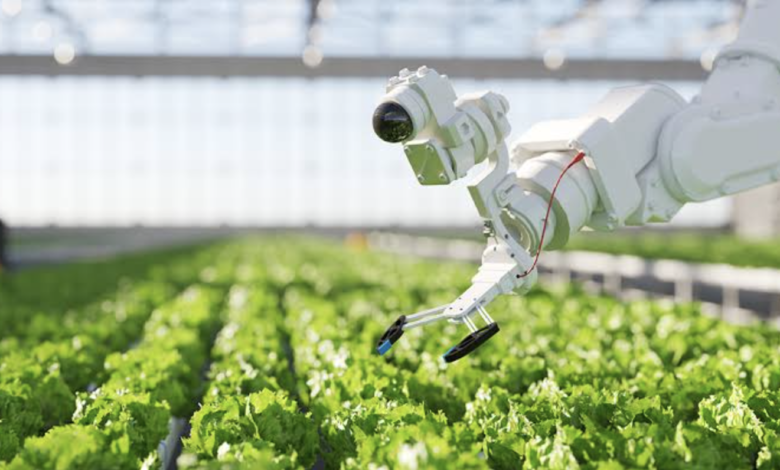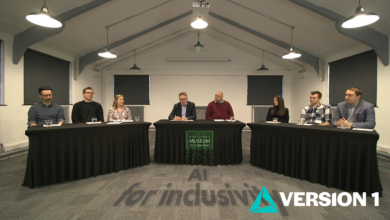
As the world’s population continues to grow, feeding everyone is becoming more important and challenging. The use of technology has been crucial in the agricultural and food production industry to meet the increasing demand of the world’s population. One of the most significant technological advancements in agriculture is the integration of Artificial Intelligence (AI) in farming and food production.
AI has the potential to revolutionize the industry by increasing yields, reducing waste, and improving overall efficiency and productivity. In this article, we will take a closer look at how AI is being used in agriculture and food production across the world, with case studies from Switzerland, the US, and Nigeria. We will delve into the benefits of AI in agriculture, the challenges faced, and the future of AI in this industry. Get ready to discover how AI is transforming the way we cultivate, process, and consume food.
The Role of AI in Revolutionizing Agro and Food Production
Artificial Intelligence (AI) has emerged as a game-changer in various industries, and the agro and food production sector is no exception. With the increasing global demand for food, coupled with challenges such as climate change and limited resources, the application of AI technologies has become crucial for sustainable, productive, and efficient agriculture.
AI has the potential to transform every stage of the food production process. By harnessing the power of data, machine learning algorithms, and advanced analytics, AI can optimize crop cultivation, enhance livestock management, improve supply chain logistics, and even revolutionize consumer experiences, boosting efficiency, innovation, and sustainability.
In this article, we will explore case studies from three different countries – Switzerland, the United States, and Nigeria – to showcase how AI is revolutionizing agro and food production in diverse contexts. These case studies will provide valuable insights into the unique challenges faced by each country and how AI technologies are being leveraged to overcome these challenges.
From precision agriculture and smart irrigation systems to predictive analytics for disease detection and yield forecasting, the potential applications of AI in agro and food production are vast. By embracing these technologies, farmers, food producers, and consumers can benefit from increased productivity, reduced resource wastage, improved quality, and enhanced sustainability.
As we delve into the fascinating world of AI in agro and food production, you will discover how these innovative technologies are reshaping the way we grow, process, and consume food.
The use of AI in precision agriculture: A case study from Switzerland
Switzerland, known for its precision, innovation, and efficiency, has embraced the use of AI in agriculture and food processing to enhance productivity, efficiency, and sustainability.
Switzerland consistently stands out as a global powerhouse of innovation, education, and quality of life. Internationally recognized for its unparalleled achievements, it holds leading positions in a variety of domains: being the most innovative country worldwide, boasting top-notch universities with unmatched international acclaim, and delivering an exceptional quality of life that resonates with both its citizens and expatriates. These accomplishments, evidenced by numerous international rankings, emphasize Switzerland’s pivotal role in setting global benchmarks, and driving businesses, industries, and societies toward excellence, innovation, and sustainable growth.
In this case study, we will delve into how Swiss farmers have leveraged AI technologies in precision agriculture.
Precision agriculture involves the application of advanced technologies, such as AI, to optimize farming practices and maximize yields. By analyzing data from various sources, including satellite imagery, weather patterns, soil conditions, and crop health, AI algorithms can provide valuable insights and recommendations to farmers.
In Switzerland, AI-powered systems have been utilized to monitor and manage crop growth in real time. By collecting data on factors like moisture levels, temperature, and nutrient content, AI algorithms can determine the precise amount of water, fertilizer, and pesticide needed for each specific area of the field. This targeted approach minimizes waste and reduces environmental impact while ensuring optimal crop growth and productivity.
One prominent example of AI application in Swiss precision agriculture is the use of drones equipped with imaging sensors. These drones fly over fields, capturing high-resolution images that can be analyzed by AI algorithms. By analyzing these images, farmers can detect early signs of plant diseases, nutrient deficiencies, or pest infestations. This early detection allows for timely intervention, preventing the spread of diseases and minimizing crop losses.
Furthermore, AI-powered predictive models have been developed to forecast crop yields based on historical data and current environmental conditions. This enables farmers to make informed decisions regarding crop rotation, market demand, and resource allocation.
Swiss farmers have embraced AI in precision agriculture not only for its potential to increase productivity but also for its positive impact on sustainability. By optimizing resource usage and minimizing the need for harmful chemicals, AI technologies contribute to more environmentally friendly farming practices.
This case study exemplifies the transformative potential of AI in agro and food production, setting a precedent for other countries to follow suit.
Enhancing productivity and sustainability through the application of AI: A case study from the United States
In the United States, the adoption of AI in agriculture has led to significant improvements in productivity and sustainability. One notable case study comes from a large-scale commercial farm in the US.
Traditionally, farmers have relied on manual labor and intuition to make decisions regarding crop management, irrigation, and pest control. However, with the integration of AI technologies, these processes have become more efficient and precise.
By leveraging AI algorithms, farmers can analyze vast amounts of data collected from sensors, satellites, and weather stations. This enables them to make data-driven decisions in real time, optimizing crop yields and reducing resource waste.
For instance, AI-powered drones equipped with multispectral cameras can capture detailed images of crops, detecting early signs of diseases or nutrient deficiencies. This early detection allows farmers to take immediate action, preventing the spread of diseases and minimizing crop losses.
Furthermore, AI algorithms can analyze historical weather patterns and predict future changes, helping farmers optimize irrigation schedules. This not only conserves water but also reduces energy consumption and lowers overall production costs.
In addition to improving productivity, AI also plays a crucial role in promoting sustainability in agriculture. By optimizing resource allocation, farmers can reduce the use of fertilizers, herbicides, and pesticides, minimizing their impact on the environment.
Moreover, AI-powered systems can monitor soil health and provide recommendations for sustainable farming practices, such as crop rotation and cover cropping. These practices help maintain soil fertility, prevent erosion, and promote biodiversity.
The successful implementation of AI technologies in the United States has not only enhanced productivity but also contributed to the sustainability of agricultural practices. As the demand for food continues to rise, AI offers promising solutions to address the challenges faced by the agriculture and food industry.
AI-powered solutions for small-scale farmers: A case study from Nigeria
Nigeria, a country heavily reliant on agriculture, has also embraced AI-powered innovations in its agriculture and food processing industry. To address the challenges of disease outbreaks in cash crops, researchers have developed Smartphone apps that utilize AI to detect viral diseases. Farmers can simply take a photo of an infected plant using the app, and the AI algorithms analyze the image to identify the specific disease. This enables farmers to quickly diagnose and treat infected plants, preventing further spread and ensuring higher yields.
In recent years, the agricultural landscape in Nigeria has been transformed by the advent of AI-powered solutions tailored specifically for small and large-scale farmers. These innovative technologies have revolutionized traditional farming practices, enabling farmers to achieve higher productivity, better crop yields, sustainability, and increased profitability.
In collaboration with local farmers and technology experts, Agtech startups are developing AI-powered mobile applications designed to assist small and large-scale farmers in making informed decisions about their farming operations. Agtech Startups like FarmCrowdy, OgaFarmer, HelloTractor, Vendease, Releaf, Agricorp, ThriveAgric, and many other Agtech companies are delivering AI-powered innovations and impact in the agriculture and food processing industry.
These AI-powered solutions have proven to be an invaluable tool for small-scale farmers in Nigeria. By equipping them with crucial information and guidance, farmers can make data-driven decisions that optimize their resources, minimize risks, and ultimately increase their crop yields.
AI-based solutions for optimizing supply chain and logistics
In today’s globalized world, optimizing supply chain and logistics has become a crucial aspect of agro and food production. Thanks to advancements in artificial intelligence (AI), businesses in the agricultural sector can now leverage cutting-edge technologies to streamline their supply chain processes and improve efficiency.
One notable case study comes from Switzerland, where AI-powered solutions have been implemented to optimize the transportation of fresh produce from farms to distribution centers. By analyzing various factors such as weather conditions, road congestion, and delivery schedules, AI algorithms can determine the most efficient routes and transportation methods. This not only reduces transportation costs but also ensures that the produce reaches its destination in the freshest possible condition, minimizing spoilage and waste.
In the United States, AI is revolutionizing the management of inventory and warehouse operations in the agro-industry. By using predictive analytics, AI algorithms can forecast the demand for different agricultural products and adjust inventory levels accordingly. This helps farmers and food producers to optimize their storage capacity, minimize stockouts, and ensure timely deliveries to meet customer demands. Additionally, AI-powered robots or drones are being employed for automated stock tracking and picking, further enhancing efficiency.
Nigeria, with its vast agricultural resources, is also embracing AI-based solutions to overcome supply chain challenges. For example, AI-powered platforms are being developed to connect farmers directly with buyers, eliminating intermediaries and reducing transaction costs. By leveraging data analytics, these platforms can match supply with demand, ensuring that agricultural products are efficiently distributed to the right markets. AI is also being used to monitor and track the transportation of perishable goods, providing real-time information on temperature, humidity, and location to ensure quality and freshness.
AI-based solutions are transforming the way supply chain and logistics are managed in the agro and food production industry. By harnessing the power of AI, businesses can optimize routes, reduce costs, improve inventory management, and enhance overall efficiency. Whether it’s in Switzerland, the United States, or Nigeria, the impact of AI on the agricultural and food production industry is undeniably revolutionary, paving the way for a more sustainable, productive, and prosperous future.
Overcoming challenges and potential risks in implementing AI in agro and food production
Implementing AI in agro and food production comes with its fair share of challenges and potential risks. However, with careful planning and consideration, these obstacles can be overcome to harness the full potential of AI technologies.
One of the main challenges is the initial investment required to integrate AI systems into existing agricultural processes. This includes the cost of acquiring AI technologies, training personnel and ensuring compatibility with existing infrastructure. However, it is important to recognize that these upfront costs can be offset by the long-term benefits and efficiencies that AI can bring to the industry.
Another challenge is the potential resistance and skepticism from farmers and workers who may be wary of adopting new technologies. Education and training programs play a crucial role in addressing this challenge, helping farmers and workers understand the benefits of AI and how it can improve their productivity and profitability. Building trust and providing ongoing support are important to successful adoption.
Privacy and data security concerns are also significant risks when implementing AI in the agro and food production sector. With the collection and analysis of large amounts of data, there is a need for robust data protection measures to ensure that sensitive information remains secure. Implementing strict data governance policies, and encryption techniques, and complying with relevant regulations can help mitigate these risks.
By addressing these challenges and potential risks, the agro and food production industry can unlock the transformative power of AI to revolutionize farming practices, enhance productivity, and contribute to sustainable and efficient food production systems globally.
The future of AI in revolutionizing the global agro and food industry
The future of AI in revolutionizing the global food industry is incredibly promising. With the ever-growing demand for food and the need for sustainable and efficient agricultural practices, AI has the potential to transform the way we produce, distribute, and consume food.
Switzerland, known for its precision and innovation, has been at the forefront of AI adoption. Zurich, Switzerland stands out as a hub of AI innovation, marrying the country’s legacy of precision with technological advancement. ETH Zurich, Switzerland’s prominent institution, serves as a foundational pillar for AI research. Switzerland’s consistent emphasis on precision aligns perfectly with AI’s demand for accuracy.
Western Switzerland is a nexus for AI research and innovation, hosting world-renowned institutes like the Idiap Research Institute and CAIM. It’s the birthplace of influential AI platforms like Torch. And the EPFL in Lausanne. Global tech giants collaborate locally, benefiting from efficient technology transfer. As Europe molds AI regulations emphasizing human rights, Switzerland’s non-EU status sees it pragmatically adapt, balancing innovation with regulatory foresight.
Swiss farmers have embraced AI technologies to monitor and manage livestock health, automate milking processes, and even predict crop diseases. By leveraging AI, Swiss farmers have achieved higher productivity, reduced costs, and improved animal welfare.
In the United States, AI is transforming the food production and processing industry. Companies are utilizing machine learning algorithms to enhance food safety and quality control measures. AI systems can quickly detect contaminants or irregularities in food products, ensuring safer consumption and reducing the risk of foodborne illnesses. Additionally, AI-powered robots are being deployed in food processing facilities to automate repetitive tasks, increasing efficiency and reducing human error.
In Nigeria, a country with a significant agricultural sector, AI is opening up new possibilities for small-scale farmers. By providing access to AI-powered platforms and mobile applications, farmers can receive personalized advice on crop cultivation, pest control, and market trends. This empowers farmers with knowledge and resources, enabling them to make informed decisions and improve their livelihoods.
The future of AI in the global agro and food industry extends beyond farming. AI is also playing a crucial role in improving food supply chain management, optimizing logistics, and enhancing personalized nutrition. With advancements in machine learning and robotics, we can expect to see further integration of AI in vertical farming, hydroponics, and urban agriculture.
As AI continues to evolve and mature, its potential to revolutionize the global agro and food industry is immense. By harnessing the power of AI, we can create a more sustainable, efficient, innovative, and resilient food system that meets the demands of a growing population while preserving our planet’s resources. The case studies from Switzerland, the United States, and Nigeria are just a glimpse of the transformative impact AI can have on agro and food production worldwide.
In Conclusion, the transformative impact of AI in the agro and food production industry cannot be underestimated. It has the potential not only to enhance productivity and profitability but also to contribute to a more sustainable and environmentally friendly approach to farming. By optimizing resource allocation, reducing waste, and improving the overall efficiency of the production process, AI can play a pivotal role in ensuring food security and meeting the growing demands of a rapidly expanding global population.
Moving forward, stakeholders in the agro and food production industry must embrace and invest in AI technologies. Collaboration between researchers, governments, and industry players is necessary to unlock the full potential of AI and ensure its widespread adoption.
As we continue to harness the power of artificial intelligence, we can look forward to a more productive, efficient, innovative, and resilient agricultural and food production sector that meets the growing demands of our global population and future generations. The future of agro and food production is indeed promising, thanks to the remarkable advancements brought about by AI-powered technologies.




